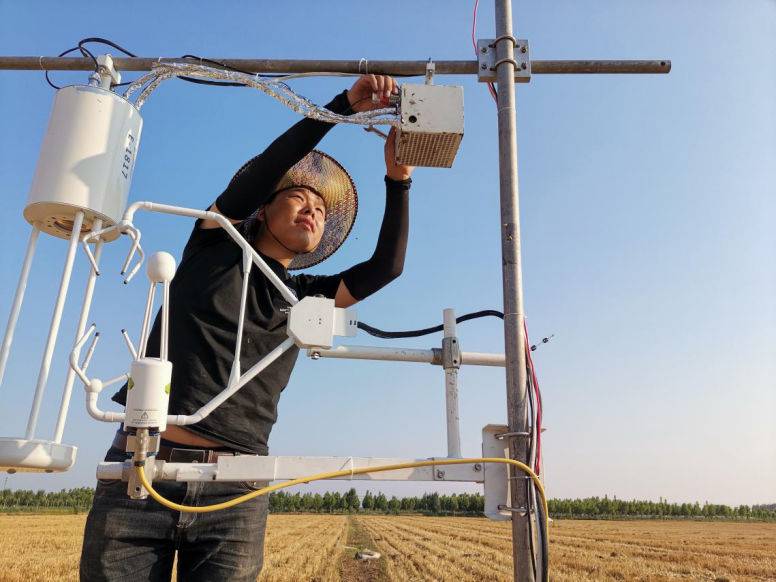 Home - TDLAS modules - Applications - HealthyPhoton collaborated with China Agricultural University for agricultural NH3 pollution control
Home - TDLAS modules - Applications - HealthyPhoton collaborated with China Agricultural University for agricultural NH3 pollution control "In developed countries, we believe that reducing ammonia (NH3) by more than 30% can limit the formation of particulate matter in the air," said Liu Xuejun, a professor at the College of Resources and Environmental Sciences of China Agricultural University. "In China, it is possible to reduce the farmland NH3 reduction by 50%."
In the past decades, with the rapid development of industry and agriculture, the production and use of nitrogen fertilizer have shown an increasing trend year after year. This process has caused a large amount of nitrogen to be released into the atmosphere in the form of nitrogen oxides, NH3, etc., and causes serious environmental issues that threaten human health. Agricultural NH3 emissions account for more than 80% of the total NH3 emissions in China. Scholars from Peking University, China Agricultural University, Beijing Academy of Environmental Sciences, and other research institutes believe that the current methods of applying agricultural fertilizers are too extensive. There is an opportunity to achieve a large degree of NH3 reduction.
HealthyPhoton and Techno Solutions have the honor to collaborate with Professor Liu Xuejun and the Institute of Atmospheric Physics of the Chinese Academy of Sciences to build a real-time NH3 flux measurement tower. The system consists of the HT-8700 open-path NH3 analyzer, Campbell ultrasonic anemometer, and LI-7500 H2O analyzer. The purpose of this research project was to carry out agricultural source pollution control to reduce NH3 emissions. The experiment was set up at the Quzhou Experimental Station, Hebei Province. By comparing nitrogen fertilizer varieties and adjusting fertilization methods, the NH3 emission flux data after sowing and fertilization of corn was studied.
After the wheat harvest in June 2020, HealthyPhoton’s application engineers installed the NH3 flux experimental system. Firstly, we measured the background NH3 flux before fertilization. A few days later, it was corn planting, fertilization, and farmland irrigation.

Figure 1 HealthyPhoton engineer setting up the HT-8700 NH3 analyzer in farmland

Figure 2 Sowing and fertilization of corn for the NH3 flux experiment setup
Figure 3 shows the change of NH3 concentration within 1 hour on the day of fertilization and irrigation. Note that the HT-8700 can capture the changes of NH3 concentration in farmland with such a high frequency, so as to calculate the NH3 flux per unit area and time combined with ultrasonic wind speed data.

Figure 3 NH3 concentration data from HT-8700 within 1 hour after fertilization
In essence, the HT-8700 is an atmospheric NH3 concentration analyzer, and its unique high-frequency measurement performance also enables it to have NH3 flux analysis capabilities. With the HT-8700, it is completely possible to obtain the NH3 concentration and flux data at the same time.
In addition, through this NH3 flux experiment, the HT-8700 ammonia analyzer demonstrated its high adaptability and reliability under the high temperature in summer. Its detection limit for NH3 flux is about 1ng N/m2/s. This proves that HT-8700 is a very useful tool for measuring the NH3 emissions of nitrogen fertilizer events, and the dry NH3 deposition in areas affected by agricultural and animal husbandry activities.
Related Links:
1. HealthyPhoton participated in ambient ammonia testing and monitoring at CNEMC
2. On-Site Mobile NH3 Measurements at Livestock Farm
3. Field Deployment of the HT8700 for Paddy Field Ammonia Emission Flux Measurements
 Tel:+86-400 961 6990 Email:info@healthyphoton.com
Add:Room 305, Building 1, Zhongchuang Science Park, Jinyuan Road, Panhuo Street, Yinzhou District, Ningbo City,China
Tel:+86-400 961 6990 Email:info@healthyphoton.com
Add:Room 305, Building 1, Zhongchuang Science Park, Jinyuan Road, Panhuo Street, Yinzhou District, Ningbo City,China


